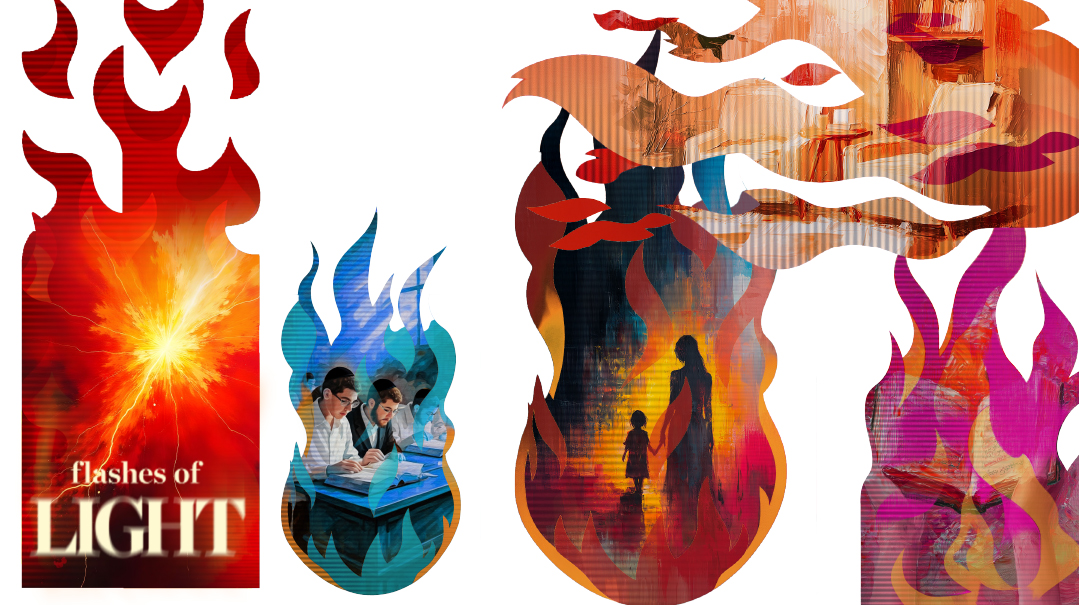Flashes of Light

The person in your life whose radiance continues to shine. Eight accounts

Coordinated by Rachel Bachrach
It’s eight days of light, pushing away the darkness of the long, bleak winter — and the winter of our lives as well. But while the radiance may seem brief, those eight days of Chanukah rise above nature, their holy illumination guiding and inspiring through the daunting cold. And like the menorah’s glow, sometimes there’s a person who crossed our path, even for a short time, and spread light in our lives that continues to shine. Eight accounts
Taking the Leap
Barbara Bensoussan
Recently we had a Shabbos guest, a single woman of about 35. She told me she had been long-distance dating someone who lived in Europe, and she was on the fence about it. Their backgrounds were different, and if they married, she might need to move across the ocean.
“But he’s the only guy I’ve dated in years who seems normal,” she avowed. “He’s the only person I’ve met in a while where I see potential.”
When she said that, words I’d heard almost 40 years ago came back to me immediately.
“You know,” I said, “A very wise woman once told me, ‘Whatever you do, have children. You’ll never regret it, no matter how the marriage turns out.’”
I
spent the summer of 1984 at Neve Yerushalayim’s heavily subsidized female out reach education program. I was in my mid-twenties and a skeptic, and I didn’t feel much in common with the starry-eyed 18- and 19-year-old students. Instead, I gravitated to more sophisticated women who were closer in age to me. One was much older, a divorced mother of teenagers who had taken an apartment for her family so she could attend classes that summer. Her name was Sarah Schyfter, she had grown up in Costa Rica, and she worked as a professor of Spanish literature at SUNY Albany. I was also in academia, teaching undergrads and most of the way through a Ph.D. program in psychology, so we bonded. I instantly warmed to her astute intelligence, regal manner, and balanced perspective on academia and the religious world.
Sometimes we’d talk about handling mitzvah observance in a university setting. I remember asking, “You teach in Albany — it’s really cold there! How do you get by wearing skirts?”
She shrugged.
“I wear long, warm skirts, tights, and boots,” she said nonchalantly. “It’s not really a problem.”
She told me she regretted never having learned Hebrew beyond the basic Hebrew of her siddur.
Shortly before the Neve program ended, I met my husband-to-be, but I wasn’t sure it was a realistic shidduch. He lived in Europe and came from a completely different background, and I didn’t know if it could develop into something serious —and marriage might mean moving across the ocean.
I visited Sarah that week to say goodbye before returning to the US. Her two sons, dressed like yeshivah bochurim, were flitting in and out of the room, taking care of this and that as we schmoozed. I mentioned the man I was dating, and she gazed fondly at her boys before turning to me.
“Whatever you do, have children,” she said. “You’ll never regret it, no matter how the marriage turns out.”
We lost contact after that, but her words would come back to me as my unlikely shidduch progressed. By then I was 27 and hadn’t found any American men who seemed right, so I decided to take the plunge. It was a risk that brought dividends in spades: More than 35 years later, we’re still married with wonderful children, baruch Hashem.
A
bout 20 years later, perhaps around 2005, my husband and I were walking through Ditmas Park when we ran into a frum woman standing outside on a porch, and started talking with her. She looked familiar, but I couldn’t figure out why, but we did discover that her daughter was my daughter’s teacher. Later it hit me that this lady might actually be my old friend, so I asked my daughter’s teacher if her mother was by any chance Sarah Schyfter.
“She is!” she responded. “But she’s not Sarah Schyfter anymore. She got remarried to Rav Shlomo Freifeld, and she lives in Far Rockaway.”
Wow! My friend had become Torah royalty, a well-deserved honor for a woman of her caliber. I procured her number, and we spoke a few times after that by phone. It was always such a pleasure, and I got small glimpses of Rav Freifeld’s gadlus through our conversations: how he insisted that she continue to teach at SUNY Albany, how he enjoyed many types of music, how he kept copies of architectural magazines in the bathroom because he appreciated beautiful things.
I wish we could have stayed in touch more closely, but I was a busy mommy and she was a busy rebbetzin, and then Rav Freifeld became ill. But our brief encounters left a deep impression. And four decades after our initial encounter, I found myself repeating her advice to a woman who, like me at the time, needed a little encouragement to jump into a promising but uncertain future.
Barbara Bensoussan is a longtime contributor to Mishpacha and an author of books for adults and children.
Oops! We could not locate your form.

